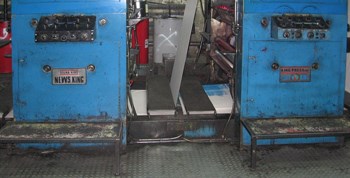Media analysts sceptical over launch of third news agency
The launch of a third commercial newswire agency to replace the nonprofit independent South African Press Association (Sapa) has led to criticism, with media analysts questioning whether it will carry new content or just repackage existing articles...

A news wire service to provide content to feed newspapers and the presses is a costly investment. Some media experts are questioning the three news wire services to replace soon-to-close SAPA. (Image public Domain)
Earlier this week, Times Media Group (TMG) - the owners of Business Day - announced plans to launch a newswire service to be known as Rand Daily Mail Newswire. The new service would start operating from the end of this month, headed by former Sunday Times editor Raymond Hartley, who edits the Rand Daily Mail news aggregator website.
Last week, Media24 announced that it would launch its newswire service, News24Wire, at the beginning of next month.
Last month, JSE-listed Sekunjalo Investment Holdings launched its Africa News Agency, which began operating with a skeleton staff.
Sapa will shut its doors on 31 March after 77 years of operation. The newswire service was originally funded by the country's major four commercial media groups, Independent News & Media, TMG, Caxton and Media24, which contributed on a roughly equal basis to its R21m annual operational costs. However, TMG pulled out just over 18 months ago, followed by Independent, leading to Sapa's liquidation.
Now analysts are questioning the wisdom of these companies pulling out of Sapa and trying to make their own commercial businesses to fill the possible market vacuum.
"The question is: are these companies starting genuine news agencies or are they just repacking content that they already have? I feel the answer is in the latter," said University of the Witwatersrand professor of journalism and media studies Anton Harber.
He also said a news agency required serious investment in terms of money and time and none of the proposed ventures appear to have the resources to fill the gap left by Sapa's demise.
They didn't want to spend then... so why now?
"If Sapa wasn't viable when the cost was shared between them, then I am not sure why the commercial ventures would be viable on their own. News agencies around the world show that they are a very serious investment in technology and news gathering.
"All these companies have been cutting back on their investment in news gathering," he said.
Media Monitoring Africa director William Bird believes that there is no real business case for a commercial wire service. He asked: "If they (the media groups) were not prepared to pay for the Sapa content now, what makes them think that someone else will be prepared to pay for it in the future?"
Bird said Media24 appeared to be the most resourced of the newswire players to replace Sapa and seemed to have an intriguing business model of offering free content to digital publications.
"However, it could be like giving free cigarettes on the school playing field in the hope that the children will grow up to be smokers," he said.
Freedom of Expression director Raymond Louw said Sapa's most unique capability was that it was always able to send reporters to events and happenings that reporters from the main media houses were not able to attend.
"The big issue now is that there will no longer be a non- commercial, nonprofit, independent news service like Sapa and the biggest fear is that government steps in and starts providing that service, because no one else is doing it," he said.
Hartley said the TMG newswire service would replace the content that Sapa used to supply to TMG's online publications.
Source: Business Day, via I-Net Bridge